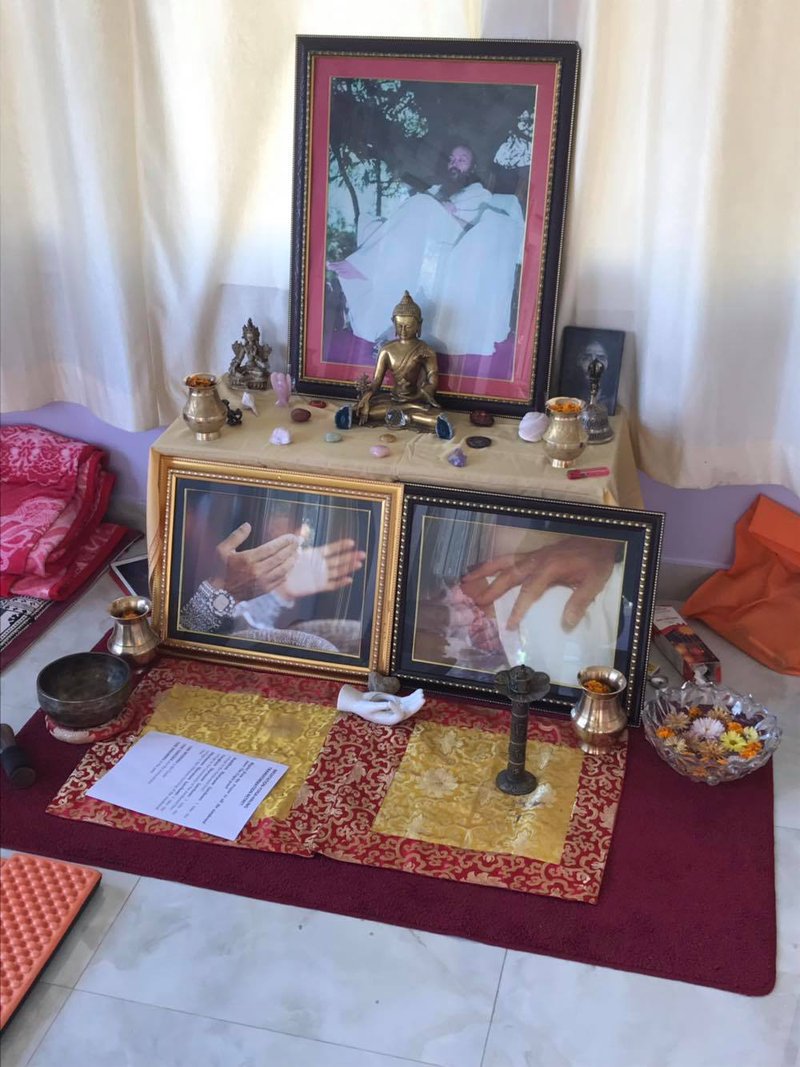
"What about your inner journey?" No answer.
Does Osho sound familiar? Some have probably watched the Wild Wild Country documentary series on Netflix. The series deals with the controversial Indian guru Bhagwan Shree Rajneesh, known as Osho, and the Rajneeshpuram community of his disciples in Oregon. Communities initiating Osho’s teachings are still found all over the world and in particular in India and Nepal. I had the chance to spend a few days in one of them near Kathmandu.
When you arrive, the instructions are clear. You have to drop all those masks that you wear out of fear or coercion and that prevent you from being fully yourself and therefore happy.
I introduce myself. With a certain pride, I quickly tell about my travels in Norway, Thailand, Vietnam and Nepal. The man interrupts me. "What about your inner journey?" No answer.
My meditation teammates are almost professional “meditators". One is a yoga teacher and has just spent a month in a temple in Pokhara, Nepal while the other is coming out of an 8-month retreat without a laptop after spending 5 years isolated from everyone. I'm just a kid vaguely in search of spirituality, a privileged one, a little bourgeois, French, who is looking for a little exoticism. My resume looks pale. But as Osho says, " You are just to be yourself. Relax! and just be yourself. Be respectful of your individuality and have the courage to sign your own signature.”. So be it. Let's go for the little bourgeois then!
Around 6pm the evening meditation begins. I'm wearing a white tunic and I look like a Christian priest! I go up to the top floor of the magnificent house where I am. I'm a minute late but everyone else is already sitting as if they've been there forever. I sit calmly. The meditation can begin. It is guided by a disciple of Guru Osho

.
The objective of the retreat is to learn Osho’s teachings based on a different interpretation of Buddha's teachings. Instead of "renouncing the world", Osho encourages to "celebrate the world". For him, the human ideal is a strange mixture between the Zorba character in Nikos Kazantwakis' novel and Buddha. Zorba’s life full of pleasure mixed with Buddha’s discernment. It is about reconciling pleasure and wisdom. Buddha's teachings often lead to asceticism, to do without any desire. This would be the key to appeasement, wisdom and therefore happiness. This is the much-vaunted awakening of the Buddha as it is generally taught. For Osho, it is necessary to celebrate life, to enjoy it, to accept it as it is, to let go of your mind and finally to reach "the total awakening of consciousness". This awakening allows us to free ourselves from our "ego" at the root of our sufferings. To access it, there is only one solution: meditation.
But what is meditation? The professor asks me - I answer clumsily that it is a question of emptying yourself and learning to live in the present moment. That's true, but it is not only that. Meditation teaches true humility, it puts us in our true place in the universe. We are only passing through the world and completely unaware of the world in which life has placed us. But more importantly, it is compassion that it is learning. Meditation makes it possible to empty yourself. Once all thoughts are put aside, there is only the "being", a universal being that did not exist, that currently exists, and that will soon no longer exist. Like all of us. Meditating is to take a step aside, to distance yourself, to be more clear-sighted, to drop your ego, to drop your mind.
The meditations are diverse - listening to Osho recordings, guided meditations, sound meditations and (my favorites) dynamic meditations. Osho is indeed the first to introduce these much-vaunted dynamic meditations. No more meditation on picketing for hours! Here, breathing exercises, mantras, dances to techno music, prayers! Our meditations are interspersed with yoga sessions and studies of Osho's philosophy.
Our professor explains it to us. "If you are unhappy or sad, tell yourself that you are committing a crime. It is a crime against God and against yourself. Life and others deserve much more. Life deserves to be lived for what it is: a chance. So take this opportunity to enjoy every moment, every day, every experience as a gift that has been given to you”.
The attractiveness of the discourse largely explains its popularity in Asia, Germany and the United States for any lover of "positive and non-binding" spirituality. Especially for the Dalai Lama, among hippy movements and even among superstars like Lady Gaga.
I am surprised on the spot by the number of photos and portraits of the preacher. Why do you need to idolize the leader? After asking people around me, they explain to me that it is only a sign of respect and nothing more. But as a French, I admit that I find this admiration closer to idolatry than a simple sign of respect. But perhaps I am simply not used to it. The term guru is indeed mostly understood as pejorative and negative in France. Here, it can just refer to a spiritual master, a guide. I am certainly facing a cultural barrier that I admit is difficult to overcome to feel completely at ease.
But I finally found there what I had come for: Asian wisdom, meditation techniques, a different way of approaching life and some answers to existential questions. Even if I can't say that I'm leaving transformed, I put on my armor and climb on my horse, full of spirituality, good feelings, soothed and rested.
Let's end this article with Osho himself and a quote that I find particularly inspiring.
"The greatest fear in the world is the opinion of others, and the moment you are unafraid of the crowd, you are no longer a sheep, you become a lion. A great roar arises in your heart, the roar of freedom”. Now I'll leave you to meditate on all this!
PS: This testimony is obviously subjective and reflects only my own opinion. I do not claim to be an expert in meditation and even less an expert in Osho’s teachings.
- Resilience And Poverty In Kathmandu: The Story Of An Encounter
- Jan 03, 2020
- Rebuilding Your Life After The Earthquake
- Dec 05, 2019
- A Frenchman In Katmandu
- Nov 14, 2019
















